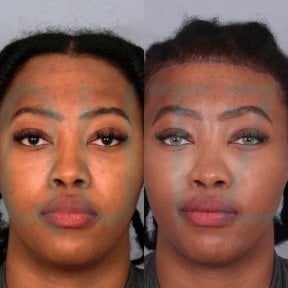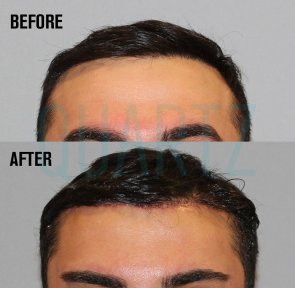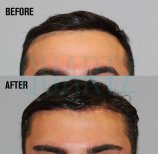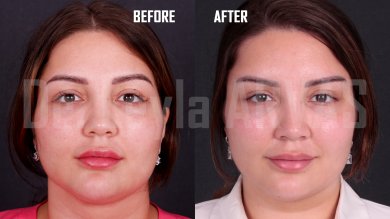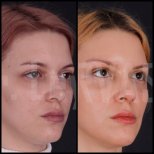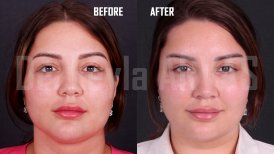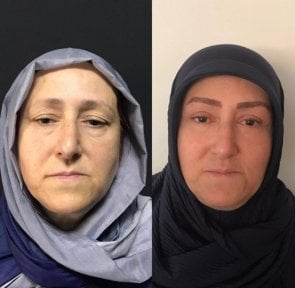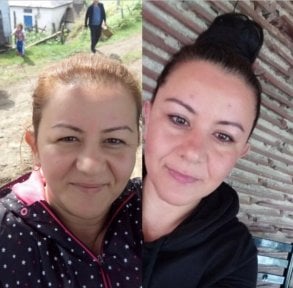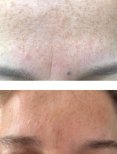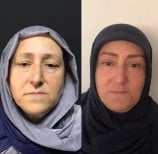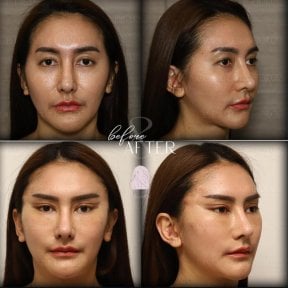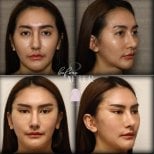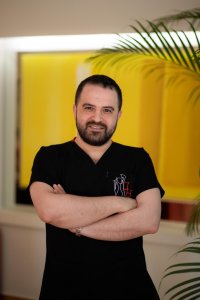Dr. Yunus Cinar, an ISAPS-certified surgeon with a portfolio of 900+ procedures, creates personalized treatment plans for each forehead lift. He performs the surgery at the multi-specialty Quartz Hospital, recognized on Bookimed as a Top Clinic. This all-inclusive package is priced at approximately $2,950. The fee covers a single room in a 4-star hotel with breakfast, premium VIP transfers, and all preoperative medical tests for a complete 7-day Istanbul stay.
How it works
How Much Does Forehead lift Cost in Turkey?
The cost of a forehead lift in Turkey typically ranges from $2,800 to $5,500. Prices vary depending on the clinic, the surgeon’s experience, and whether the procedure is endoscopic or open. In the United States, the average cost is $11,000 (per ASPS). This means you can save about 62% by having a forehead lift in Turkey.
Turkish packages usually include the initial consultation, pre-op blood tests, post-op medication, follow-up visits, personalized treatment plans, and 24/7 patient support. Meals during clinic visits and English-speaking staff are also included. In the U.S., the base price often covers only the surgeon’s fee, with anesthesia, facility, and aftercare billed separately. Always confirm exactly what’s included at your chosen clinic.
Key Benefits
- Get a forehead lift in Turkey at 60-70% less than in the USA and UK.
- Options available: endoscopic brow lift, coronal lift, and temporal lift.
- Free photo review by a doctor to determine the best forehead rejuvenation method for you.
- 100% data protection and confidentiality guarantee.
- Exclusive deals from trusted Turkish clinics from $2,808.
| Turkey | The UK | The USA | |
| Forehead lift | from $2,808 | from $6,500 | from $8,000 |
| Brow lift | from $2,085 | from $5,000 | from $8,000 |
Medically reviewed by
Fahad MawloodForehead lift Packages in Turkey — February 2026
This endoscopic brow lift uses minimally invasive techniques, including thread lifting options. The package from Quartz Hospital costs around $2,700, saving about $1,700 off the regular price. Dr. Yunus Cinar, trained under Prof. Giovanni Botti in Italy, performs the procedure. The all-inclusive stay covers one night hospitalization and six nights in a 4-star hotel. The ISAPS-certified clinic also provides VIP transfers, blood tests, and a follow-up examination.
This $2,800 package provides a complete 5-day program – surgery, 4-star hotel, meals, and VIP transfers. Dr. Hasan Sahin, a board-certified plastic surgeon with over 12,000 aesthetic surgeries, performs the forehead lift at the JCI-accredited Hisar Hospital Intercontinental. The price covers one night of hospital care with nursing, 4 nights hotel accommodation, and dedicated translator support. The clinic, treating over 500,000 patients annually, structures this as a single-stay program for international patients.
Dr. Hasan Sahin's endoscopic brow lift uses small incisions for precise, natural-looking lifting and minimal scarring. At Hisar Hospital Intercontinental, this board-certified surgeon performs the procedure for approximately $2,100 – covering the operation, hotel, and all transfers. The package includes two nights in a 4-star hotel with concierge and translator support. The JCI-accredited hospital meets international safety standards and welcomes over 500,000 patients annually.
This endoscopic technique minimizes scarring and reduces recovery time, with upper eyelid blepharoplasty included for complete rejuvenation. Dr. Ugur Horoz, a European Board-certified surgeon with 900+ procedures performed, performs the lift at the highly rated Dr. MED clinic. The total cost is approximately $10,400, covering general anesthesia, one hospital night, five hotel nights, and VIP transfers. Patients return home after about 7 days in Turkey, typically resuming work in 7-8 days.
Discover the Best Forehead lift Clinics in Turkey: 7 Verified Options and Prices
Istanbul Aesthetic Plastic Surgery Center
Lokman Hekim Istanbul Hospital
Murat Yaman
Hair Clinic
Forehead lift Overview in Turkey
- Forehead lift - from $2,808The procedure smooths forehead wrinkles and lifts brows via small incisions, enhancing one"s facial features.
- Brow lift - from $2,085The procedure elevates sagging brows, smoothes forehead lines, creating a more alert, youthful appearance via surgical modification.
Day 1
- Arrive in the country and enjoy VIP transfer to your hotel.
- Settle into your 4-star accommodation.
- Language assistance will be available if needed.
Day 2
- Have a consultation with a plastic surgeon.
- Undergo necessary medical tests for pre-operation assessment.
Day 3
- Prepare for the Forehead lift surgery.
- Receive anesthesia before the procedure.
- The surgery usually takes up to 2 hours.
Day 4
- Stay in the clinic for post-operative care and monitoring.
Week 1
- Recovery process begins under the clinic"s supervision.
- Attend follow-up consultations with the surgeon.
Week 2-3
- Continue to rest and recover at your accommodation.
Week 4
- You can return to work.
Week 6
- You can return to regular physical activities.
Month 3
- You should see the final result of the Forehead lift.
Please note: Each case is unique and the timeline may vary depending on individual circumstances.
What patients like:
- Cost. The Forehead lift cost in Turkey ranges from $2,808 to $5,500. This price is significantly lower than in the USA or UK, where it can reach up to $15000.
- Doctor’s professionalism. Patients appreciate the high level of professionalism displayed by Turkish doctors. They are often members of international medical associations and have numerous successful procedures under their belts.
- Service level. Many patients report excellent service in Turkish clinics. This includes everything from the initial consultation to post-operation care. They also appreciate the convenience of having accommodation and transfers included in the package.
- Forehead lift efficacy. The results of forehead lifts in Turkey are typically highly satisfactory. Modern techniques and equipment are used, ensuring the best possible outcome.
- Logistics. Patients find the logistics of having a procedure in Turkey to be straightforward. The package often includes airport transfers and accommodation, which makes the whole process smoother and less stressful.
What patients don’t like:
- Waiting time. Some patients have reported long waiting times for procedures in Turkey. This can be a source of frustration and inconvenience.
- Communication. There can be language barriers in some clinics, which can lead to misunderstandings or confusion.
- Post-operation care. While the immediate post-operation care is often good, some patients have had issues with follow-up care once they are back home. This can make it difficult for them to address any concerns or complications.
- Bookimed deposit: $200 or €200.
- Clinic deposit: Pay a set percentage in advance.
Bookimed, a leading global medical tourism platform, is committed to helping clients looking for Forehead lift in Turkey by offering expert assistance and trustworthy medical solutions for every situation. Smart automatic ranking system is used to compose transparent clinic listings, meticulously maintained by a data scientist using AI for accuracy. The platform guarantees authenticity by publishing reviews from real patients after their treatments. Bookimed offers comprehensive medical solutions, with updates from clinics to ensure trustworthiness. The content about Forehead lift in Turkey, crafted by experienced medical authors and reviewed by specialists, adheres to Bookimed"s Editorial Guidelines, reflecting the platform"s commitment to delivering high-quality and clear health information. For more details or inquiries, feel free to contact us at marketing@bookimed.com or learn more about us and our mission here.
Our Trusted Doctors
View all DoctorsMurat Yaman
Performs 500-600 cosmetic procedures annually – Dr. Yaman focuses on achieving natural-looking results.
- Specializes in a range of aesthetic surgeries including forehead lifts, face lifts, and rhinoplasty
- Trained in basic microsurgery at Hacettepe University
- Member of the Turkish Society of Reconstructive, Aesthetic, and Plastic Surgery
- Dedicated to achieving high patient satisfaction through personalized results
Hasan Sahin
Performed over 12,000 aesthetic surgeries, including specialized forehead lifts at Hisar Hospital Intercontinental.
- Graduated from GATA and trained at İzmir Dokuz Eylül University
- Specializes in facial aesthetic procedures like brow lifts and blepharoplasty
- Expert in craniofacial surgery and microsurgical techniques
- Member of Turkish Society of Plastic Surgeons
yunus Cinar
Dr. Yunus Cinar trained at Villa Bella Clinic in Italy under Prof. Giovanni Botti, specializing in facial aesthetics and rhinoplasty.
- Completed residency in Plastic, Reconstructive, and Aesthetic Surgery
- Participated in numerous scientific congresses on facial aesthetics
- Works at Quartz Hospital, focusing on aesthetic surgery
Aysel Pasazade
Dr. Aysel Pasazade is a plastic, reconstructive, and aesthetic surgeon. She graduated from Istanbul University Cerrahpaşa Faculty of Medicine. She completed her specialization at Bursa Uludağ University Faculty of Medicine. She holds the European Board of Plastic, Reconstructive and Aesthetic Surgery (EBOPRAS) certification.
She has worked in university hospitals and private clinics. She attends international congresses, live surgery courses, and advanced training. This keeps her practice current. She provides careful, personalized care with a focus on patient safety, function, and natural-looking results.
Video Stories from Bookimed Patients
Reviews about Bookimed: Discover Patients' Insights
All reviewsForehead lift: Before & after photos
View allShare this content
FAQ about Forehead lift in Turkey
Is Turkey a good place for Forehead lift procedure?
According to patient reviews and clinic descriptions, Turkey is a good place for forehead lift because of the high quality of treatment, experienced doctors, and high success rates.
- Memorial Şişli Hospital in Istanbul is the largest multidisciplinary medical center in Istanbul and is accredited by Joint Commission International (JCI) for the high quality of treatment. It is the first hospital in Turkey and the 21st in the world to receive this accreditation.
- Hisar Hospital Intercontinental is another multi-specialty medical center in Turkey that specializes in pediatric and adult cardiovascular surgery, orthopedics, oncology, weight loss surgery, and check-ups. It is certified by JCI that confirms compliance with international standards of treatment quality and safety.
- SALUSS Medical Group and BHT Clinic are also well-known for their hair transplants, aesthetic surgeries, dental treatments, obesity surgeries, eye surgeries, orthopaedic, neuro, heart and cancer treatments, and many other types of treatment.
Patients from various countries choose Turkey for medical treatments, including CIS, Europe, the USA, and Canada. Memorial Şişli Hospital alone receives patients from 92 countries annually. According to Bookimed, patients are given amazing service from the very beginning, and the doctor coordinators are patient and answer all questions and concerns thoroughly. The hospital coordinators are excellent and sort everything out, including taxi transfers to/from airport, accommodation and hospital, all translations with admission staff at the hospital, nurses, anesthetists, etc. The hospital and nursing staff are excellent and take care of patients very well. Patients can ask for help any time of the day and can come and get checked if they have any concerns, which is not as flexible as in the UK.
Therefore, Turkey is a good place for forehead lift, and patients can expect high-quality treatment, experienced doctors, high success rates, and excellent service.
How long does it take to get Forehead lift in Turkey?
Which hospital is best for Forehead lift in Turkey?
Bookimed's rating has revealed the top 5 hospitals in Turkey for Forehead lift:
- Cirta Care Clinic - Price: $7500
- BHT Clinic
- Hisar Intercontinental Hospital
- Estherian Clinic
- EsteCapelli Clinic
Who is the best Forehead lift doctors in Turkey?
Bookimed has identified the top doctors in Turkey who excel in performing Forehead lift:
- Ali Nurhan Özbaba, Plastic Surgery, 34 years experience, with 5.0 reviews score
- Hasan Sahin, Plastic Surgery, 17 years experience
- Burak Pasinlioglu, Plastic Surgery, 10 years experience
- Ilker Manavbaşı, Plastic Surgery, 22 years experience, with 4.7 reviews score
- Ali Can Gunenc, Plastic Surgery, 10 years experience
What is the level of medicine in Turkey?
Healthcare is the key development sector of the Turkish government. The Turkish authorities are convinced that care for the citizens' health should be an absolute priority of state policy and spend about 77 billion liras for healthcare annually.
As a result, 28,000 medical facilities provide excellent medical care in the country. About 50 centers have certificate of JCI (Joint Commission International), the international improver of healthcare quality and safety across the globe. The index of certificates obtained is the largest. To compare, Israel has 20 JCI-accredited facilities, and Germany — only 10 clinics of this type.
What should you know about Turkey before the trip?
| Currency | lira (you also can pay for services in dollars and euros) |
| Best period for the trip | May-October |
| Language | Turkish (most of medical staff speaks English fluently) |
| Visa | is not required for a trip of at least 30 days per visit |
| Time difference with Europe | 3 hours |
| Time difference with the USA | 8 hours |
| Capital | Ankara |
| Medical tourism center | Istanbul |
| Popular resorts | Alanya, Antalya, Kemer, Marmaris |
What hotel services are provided here?
In Turkey, hotels of different price ranges and service levels are presented. The level of Turkish hotels is comparable to hotels in Tunisia, Morocco or Egypt. Most tourists choose 4 and 5 star hotels with all-inclusive meals. Such hotels have everything for a comfortable stay: varied food, a large well-groomed territory, animation for children and adults. Some hotels have their own water park, which guests can use for free. Budget travelers can afford to book an economical 3-star hotel with half board or no meals at all.
When is the best time to travel to Turkey?
The main advantage of Turkish resorts is the long beach season. On the Mediterranean coast, it starts in April and lasts until November. In the resorts of the Aegean Sea — from May to October. The most comfortable time for swimming is from mid-June to the end of October. A large influx of tourists is in July-August, when the air temperature is +38°C, and the water warms up to +27°C.
Do I need a visa?
In 2020, the Republic of Turkey has visa-free agreements with 89 states. Some foreigners are exempted from obtaining entry visas, others are required to receive an electronic visa (e-Visa), and still others must apply for a visa at Turkish missions abroad.
What states need a visa for treatment in Turkey and what countries can cross the border free and easy read here.
What documents are required to apply for a visa to Turkey for treatment?
Visas for travel to Turkey require a number of documents. The necessary papers can be submitted 90 days before the planned departure. Lists of documents includes:
- ID card
- confirmation of online registration and filling out the questionnaire
- certificate of income and availability of funds ($50 per day per person)
- insurance policy for a stay in Turkey (original and copy)
- 2 photos (5x6)
- visa receipt
- booking of flight and hotel
- medical opinion about the need for treatment.
